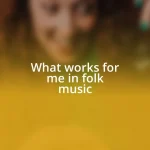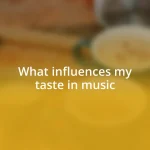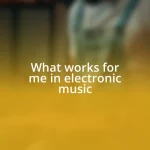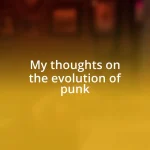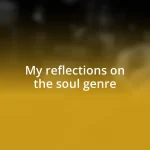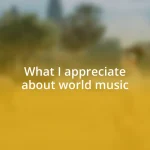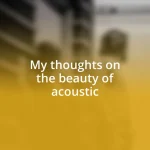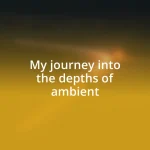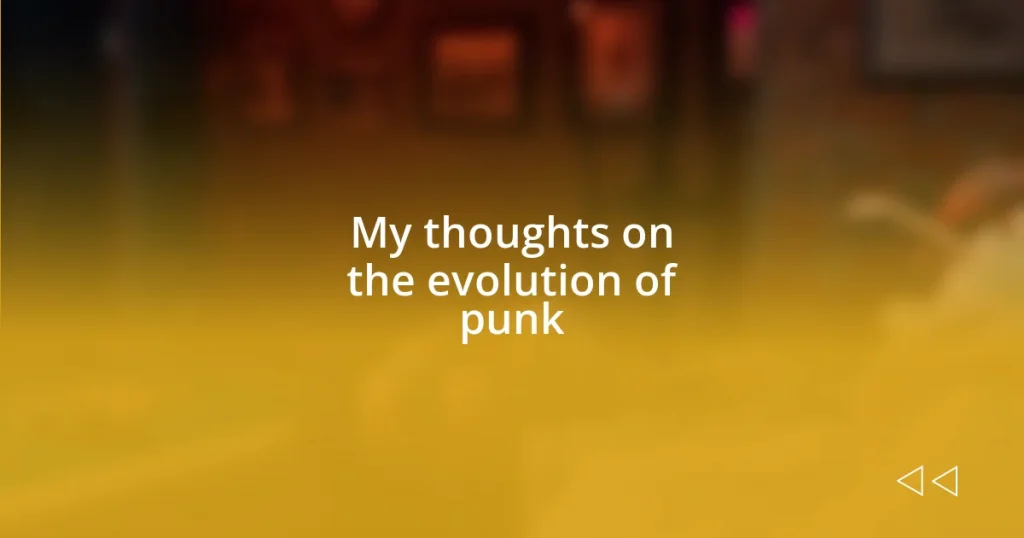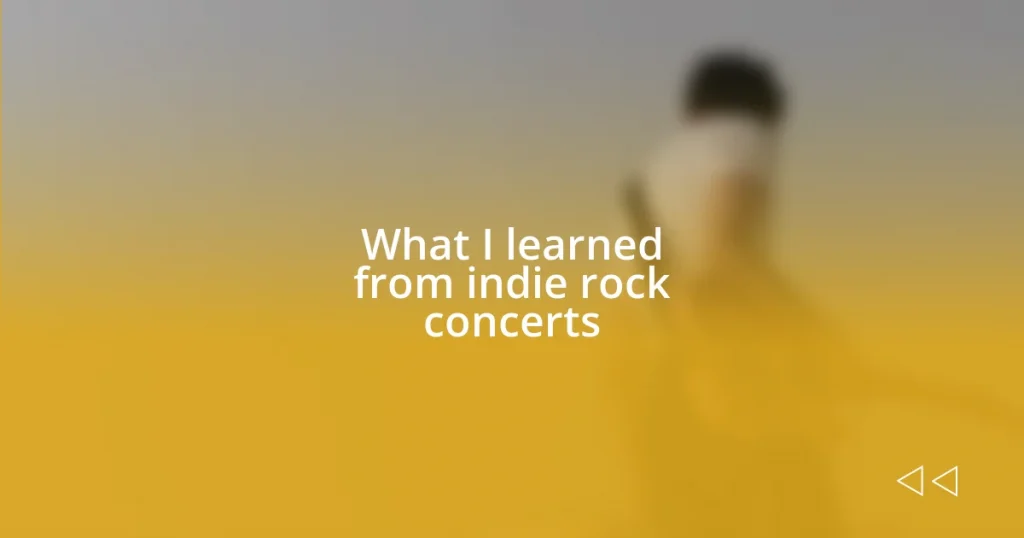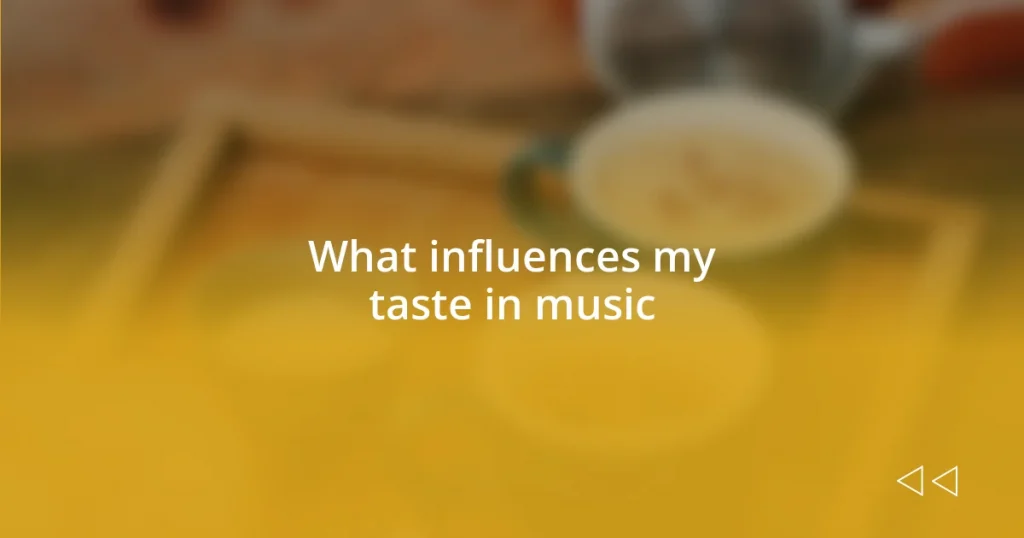Key takeaways:
- Punk music originated from garage rock and proto-punk bands, emphasizing raw energy, DIY ethics, and a rebellion against mainstream music.
- The genre evolved through influences like glam rock, reggae, and art punk, serving as a voice for disenfranchised youth and a medium for social commentary.
- Contemporary punk maintains its relevance by addressing modern issues and adapting through technology, showcasing subgenres that focus on themes like mental health and social justice.
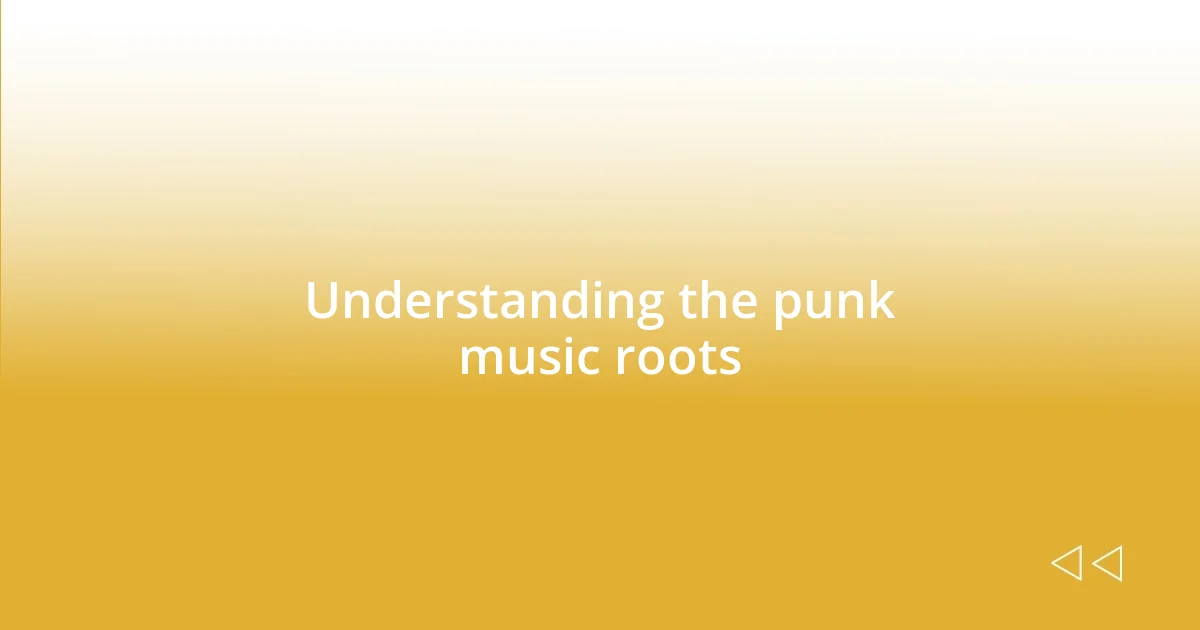
Understanding the punk music roots
Punk music doesn’t just spring up out of nowhere; it has deep roots intertwined with various musical styles from the ’60s and ’70s. Think about the garage rock and proto-punk bands like The Stooges and MC5—these groups took raw energy and combined it with a DIY ethic. They created sounds that were more about visceral emotion than technical perfection. Doesn’t it make you ponder how the hunger for authenticity and rebellion against mainstream music found its voice through these early pioneers?
Reflecting on my own journey with punk, I vividly remember the first time I heard the iconic riff of “Blitzkrieg Bop” by The Ramones. It felt like someone peeled back layers of pretense, revealing a world filled with sheer honesty and frenetic spirit. This infectious simplicity resonated with a generation weary of polished pop culture. Can you recall a moment when music spoke directly to your frustrations? That’s what punk music began to embody for countless fans.
As punk evolved, it became a canvas for expressing discontent and social commentary. Bands like The Clash tackled issues of politics and class, weaving them seamlessly into their lyrics. I often find myself questioning how music can act as a mirror to society’s flaws. Isn’t it fascinating how punk’s raw attitude not only reflected the chaos of its time but also inspired waves of change?
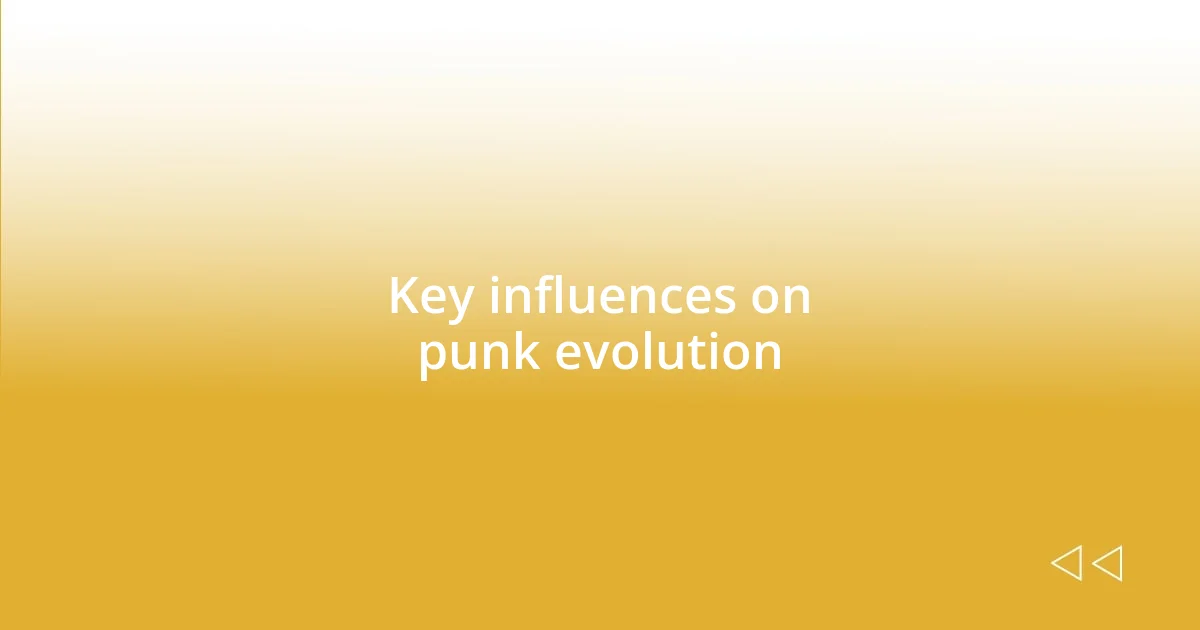
Key influences on punk evolution
The evolution of punk is a tapestry woven from various musical threads and cultural movements. One notable influence came from the glam rock scene, where artists like David Bowie and T. Rex embraced flamboyance and defiance. This sense of rebellion fed into punk’s ethos, prompting bands to strip down the theatrics while keeping the spirit of challenge alive. I remember grappling with my own identity during my teenage years, and seeing punk artists being unapologetically themselves was a revelation. It ignited a spark in me to embrace my individuality without fear.
Another critical aspect of punk’s evolution stems from the socio-political climate of the time. The disenfranchised youth in the UK and the US sought a voice to vocalize their frustrations, and punk provided that outlet. Here are some key influences that shaped punk’s evolution:
- Garage Rock: Raw, stripped-down sounds from bands like The Stooges.
- Glam Rock: The theatricality and rebellion of artists like David Bowie.
- Reggae and Ska: Influencing a fusion in bands like The Clash, bridging cultures.
- Art Punk: The experimental approaches of groups like Talking Heads and Blondie, pushing creative boundaries.
- DIY Culture: A grassroots approach where bands took control of their production and distribution.
Thinking back, I recall the exhilaration of attending a local punk show. It wasn’t just about the music; it was a space charged with political discourse and community spirit, a testament to how punk empowered an entire generation to speak up and stand out.
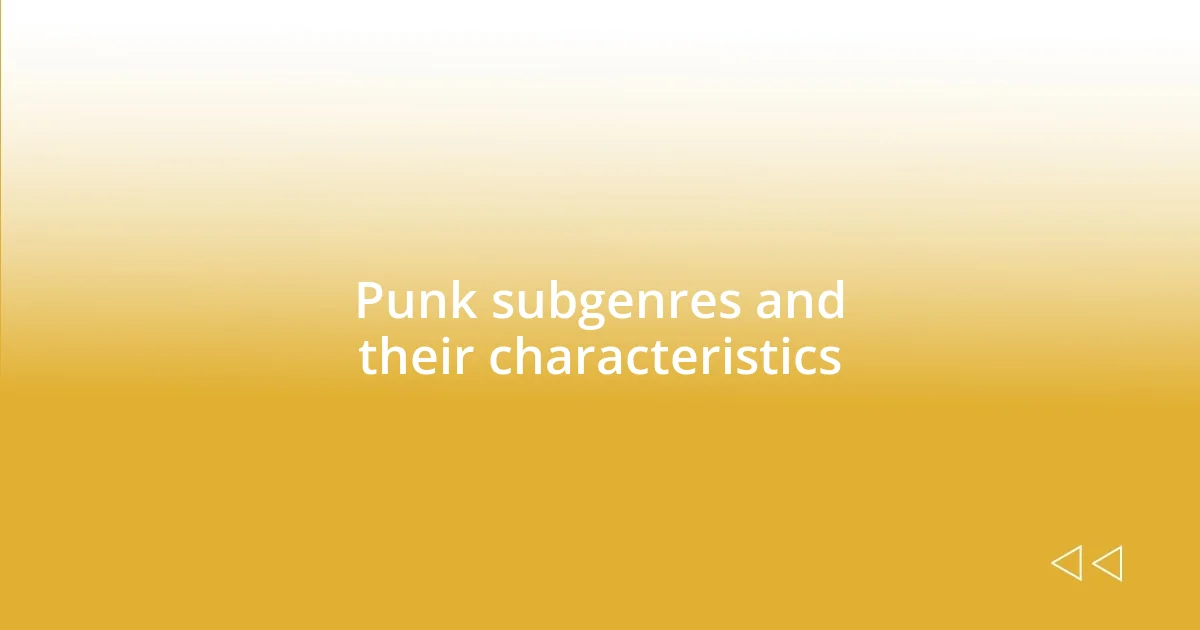
Punk subgenres and their characteristics
Punk subgenres each offer unique characteristics that reflect different aspects of rebellion and identity. For instance, skate punk brings a high-energy sound characterized by fast tempos and melodic hooks, often tied closely to skate culture. When I first discovered bands like Pennywise, I couldn’t help but feel a rush—their music echoed the thrill of hitting the skate park. Does that blending of music and lifestyle resonate with you? It certainly does for me.
Another subgenre worth noting is horror punk, which dabbles in themes of horror and the macabre, often marked by theatrical elements. I remember seeing The Misfits for the first time—it was a spectacle! Their blend of punk with horror visuals created an experience that was chilling yet exhilarating. It made me think about how punk can embrace not just social issues, but also our collective fascination with the darker sides of life.
Lastly, let’s not overlook post-punk, which emerged as bands began to experiment with sound and structure, moving away from traditional punk forms. Groups like Joy Division and Siouxsie and the Banshees redefined the scene—bringing in darker tones and more introspective lyrics. Reflecting on these shifts, I often wonder how post-punk has impacted modern music’s landscape. Isn’t it incredible how these variations demonstrate punk’s versatility while still holding onto its rebellious roots?
| Subgenre | Characteristics |
|---|---|
| Skate Punk | Fast tempos, melodic hooks, linked to skate culture. |
| Horror Punk | Horror themes, theatrical elements, engaging visuals. |
| Post-Punk | Experimental sound, darker tones, more introspective lyrics. |
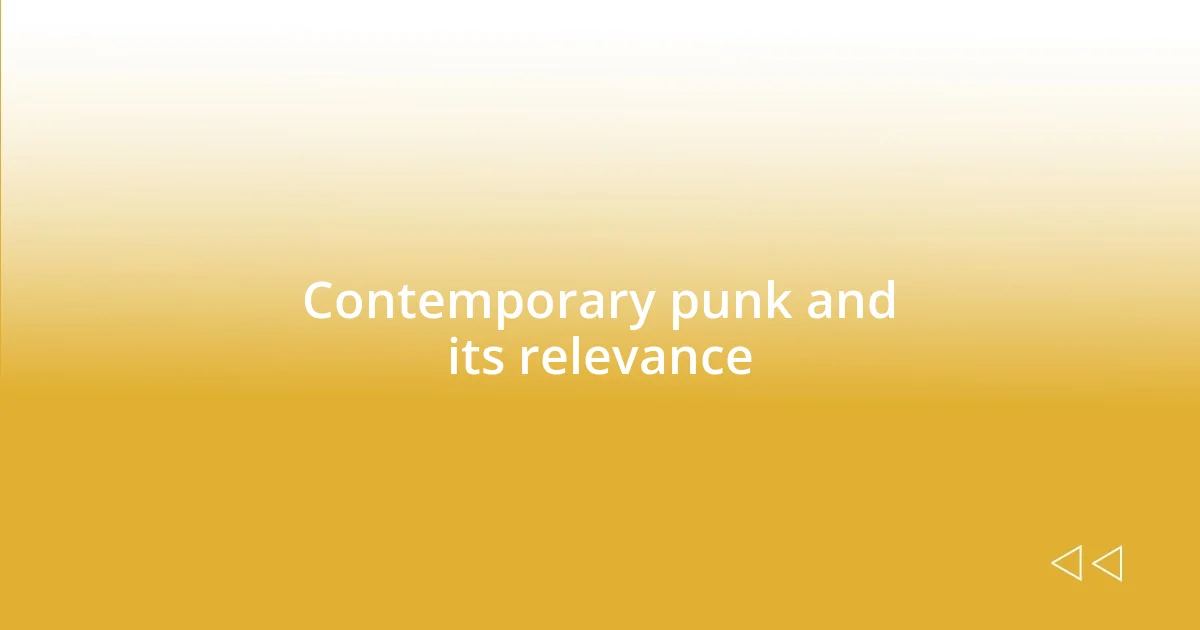
Contemporary punk and its relevance
The contemporary punk scene is a fascinating blend of the old and new, evolving while remaining deeply rooted in its rebellious origins. I often find myself attending local shows that showcase up-and-coming punk bands, and it’s a thrill to see how they infuse modern issues into their music. The lyrics resonate with my own experiences—touching on themes like mental health, social justice, and the climate crisis. Don’t you think it’s powerful how music can still serve as a voice for the frustrated?
Moreover, the accessibility of technology has transformed the DIY ethic that defines punk today. I remember when I first started recording my own music on a simple setup in my bedroom. It felt liberating to take control of the creative process, just as punk artists have always done. Now, platforms like Bandcamp and social media allow aspiring artists to share their work with the world effortlessly. It makes me wonder: is there a limit to how we can express ourselves in this digital age?
In this contemporary landscape, punk continues to thrive, morphing into various subgenres that push the envelope. I think of acts like IDLES or PUP, who tackle personal and political themes with an energy that feels both raw and pertinent. Their music reminds me of those feelings of unity and belonging from my youth, as if each chord struck pulls people together, affirming that punk is still a vital form of expression. Doesn’t it excite you to realize that punk is not just a genre, but a way of life that continually adapts to the times?

Personal reflections on punk’s future
As I think about punk’s future, I feel a mix of nostalgia and excitement. I still remember that first explosive gig I attended—it was like nothing else! The energy in the room was electric, filled with people from all walks of life, unified in their passion for music that questioned the status quo. It leads me to wonder: how will the next generation of punks express their defiance in a world that seems more divided than ever?
In recent years, I’ve been reflecting on how punk has not only survived but thrived in the face of rapid change. I recall chatting with a younger friend who passionately shared her views on climate activism and how she incorporates those themes into her songwriting. It hit me then that punk isn’t just a sound; it’s a platform for social commentary that continuously evolves. Isn’t it fascinating to see how today’s youth interpret rebellion through their own lens while carrying the spirit of punk forward?
Looking ahead, I genuinely believe that punk’s adaptability will ensure its relevance. I think about how I’ve witnessed community-building efforts at local punk shows, fostering connections among diverse groups. With online spaces amplifying voices of the marginalized, perhaps punk will bridge even more gaps in society. Could this open the door for a new era where punk becomes synonymous with global solidarity? I really hope to see this vibrant, ever-changing scene continue to resonate, inspiring new generations to band together and voice their truths.
